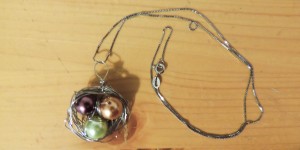
One of the Bird’s Nest necklaces I help make for Volunteer Connections – sometimes fieldwork feels as complicated as these little circles of twisted wire.
Before beginning my research I had a bit of a naive vision of what doing field work was like. I expected conversation with participants to flow easily and naturally, and that whenever I wanted to I could just nonchalantly duck off to the side and jot down notes. It’s not that easy. Much of the time (and especially in the beginning) fieldwork is awkward. There have been moments where I have felt put on the spot as the “researcher” and have struggled with exactly where I should fit in.
My first experience with one of the groups I work with, a leadership group called Volunteer Connections, was full of such moments. Firstly, as Chiseri-Strater and Sunstein emphasize, doing your background research before directly interacting with people is important (FieldWorking 2007: 221). I wish I had done this more thoroughly, because as I learned quickly a newcomer always sticks out. I had assumed Volunteer Connections only met to work on their projects, so I was surprised when everyone gathered around at the beginning for a talking circle. Many of the participants shared very personal stories about their lives, and the experience was quite emotional. When it was my turn to share something with the group I felt I had been caught off-guard. All of these people were strangers, but I now knew very personal things about many of them. Was it impolite of me to not reciprocate with a story on an equally personal and intimate level? But wasn’t it also inappropriate of me as a researcher to break this boundary so early on? I chose a safe route and told a mundane anecdote, which was an appropriate choice considering that I was there as a newcomer. However, this left me feeling a little unbalanced, like I was only receiving information but keeping myself distant from the group. As we moved onto the crafting section of the workshop I found myself in more moments of discomfort as the group was silent a lot of the time while learning some new instructions on how to make our bird’s nest necklaces (pictured above). I wasn’t sure how to naturally strike up conversation with the people sitting next to me without feeling like I was conducting a mini interview. I wasn’t even entirely sure how to watch without feeling too much like I was “studying” them. This is an ongoing struggle in ethnographic research – you’re a researcher asking about peoples’ lives. It’s personal, yet distant at the same time. The next time I volunteered in a program that I hadn’t been to before I made sure I was better prepared. I read about the program beforehand and asked my supervisor questions to clarify the project. Throughout the next workshop I felt more at ease, since there were not as many surprises and I was familiar with the purpose and structure of the group.
As Chiseri-Strater and Sunstein point out, “[w]hat’s important about researching place is to understand how we acquire our spatial gaze, how that gaze informs our look at others, and what’s behind the gaze of others who look back at us.” (2007: 198) Doing hands-on ethnographic research is an enriching way to explore the perspectives of yourself and others, and learning about how others see the world is a complex and intricate process. When one adds language and cultural differences, then mistakes and miscommunication are bound to happen. What matters is being able to get past the uncomfortable feelings and use that moment as a learning experience, a chance to point out something to yourself that you didn’t know before.
References
Chiseri-Strater, Elizabeth & Bonnie Stone Sunstein
2007 FieldWorking: Reading and Writing Research. Boston: Bedford/St. Martins
